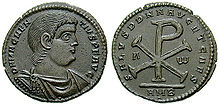- Magnentius
-
Flavius Magnus Magnentius usurper of the Roman Empire 
Although Magnentius restored certain rights to the Pagans, the reverse of this coin bears a prominent Christian chi-rho.Reign January 18, 350 – August 11, 353 Born 303 Birthplace Samarobriva, Gaul Died August 11, 353 (aged 50) Place of death Mons Seleucus Predecessor Constans Successor Constantius II Wife Justina Flavius Magnus Magnentius (303 – August 11, 353) was a usurper of the Roman Empire (January 18, 350 – August 11, 353).
Contents
Early life and career
Born in Samarobriva (Amiens), Gaul, Magnentius was the commander of the Herculians and Iovians, the Imperial guard units.[1] When the army grew dissatisfied with the behavior of Roman Emperor Constans, it elevated Magnentius at Autun on January 18, 350. Constans was abandoned by all except a handful of retainers, and he was slain shortly afterwards by a troop of light cavalry near the Pyrenees.
Usurper
Magnentius quickly attracted the loyalty of the provinces in Britannia, Gaul, and Hispania, in part because he proved to be far more tolerant towards both Christians and Pagans. His control on Italia and Africa was applied through the election of his men to the most important offices. However, the short-lived revolt of Nepotianus, a member of the Constantinian dynasty, showed Magnentius that his status of Emperor was to be consolidated against the members of that dynasty.
The self-proclaimed emperor tried to strengthen his grasp on the territories previously controlled by Constans, moving towards the Danube. Vetranio, commander of the Pannonian army, had been elected Augustus by his troops in Mursa on 1 March. This revolt had a loyalist mark, since Vetranio was supported by Constantina, and Constantius II himself recognized Vetranio, sending him the imperial diadem.
Demise
The remaining emperor of the family of Constantine I, Constantius II broke off his war in Syria with Persia, and marched west. Despite Magnentius' efforts to gain Vetranio to his cause, the old general reached Constantius with his army, and resigned the crown.
After electing Magnus Decentius (probably his brother) to Caesar and gathering as many troops as possible, the armies of Magnentius and Constantius met in the Battle of Mursa Major in 351; Magnentius led his troops into battle, while Constantius spent the day of battle praying in a nearby church. Despite Magnentius' heroism, his troops were defeated and forced to retreat back to Gaul.
As a result of Magnentius' defeat, Italy ejected his garrisons and rejoined the loyalist cause. Magnentius made a final stand in 353 in the Battle of Mons Seleucus, after which he committed suicide by falling on his sword.
Following the suppression of Magnentius' rebellion, Constantius commanded an investigation be made to find his followers. The most notorious agent in this search was the primicerius notariorum Paulus Catena.
Some sources state that Magnentius' father was a Briton and his mother a Frank.[2]
Notes
References
- Cameron, Averil, and Peter Garnsey ed., The Cambridge Ancient History, Vol XIII, Cambridge University Press, 1988.
- Drinkwater, J.F. (2000). "The revolt and ethnic origin of the usurper Magnentius (350–53), and the rebellion of Vetranio (350)". Chiron (30).
External links
 Media related to Magnentius at Wikimedia Commons
Media related to Magnentius at Wikimedia CommonsPolitical offices Preceded by
Sergius,
NigrinianusConsul of the Roman Empire
351
with GaisoSucceeded by
Flavius Magnus Decentius Caesar,
Paulus ,
Flavius Iulius Constantius Augustus V,
Flavius Claudius Constantius CaesarPreceded by
Flavius Magnus Decentius Caesar,
Paulus ,
Flavius Iulius Constantius Augustus V,
Flavius Claudius Constantius CaesarConsul of the Roman Empire
353
with Flavius Magnus Decentius Caesar II,
Flavius Iulius Constantius Augustus VI,
Flavius Claudius Constantius Caesar IISucceeded by
Flavius Iulius Constantius Augustus VII,
Flavius Claudius Constantius Caesar IIICategories:- 303 births
- 353 deaths
- 4th-century Roman usurpers
- People from Amiens
- Frankish people
- Imperial Roman consuls
- Magistri militum
- Roman emperors who committed suicide
- Suicides by sharp instrument
- 4th-century Roman emperors
Wikimedia Foundation. 2010.
